Meet the Future Shapers of 2019 who are inspiring women worldwide
This year's Marie Claire Future Shapers Awards, in partnership with Neutrogena, saw us recognise the work of 10 trailblazing powerhouses, who are working hard to make the world a happier, safer and better place for women in 2019...

This year's Marie Claire Future Shapers Awards, in partnership with Neutrogena, saw us recognise the work of 10 trailblazing powerhouses, who are working hard to make the world a happier, safer and better place for women in 2019...
We sat down with our 10 game-changing females to learn more about what motivates them, and keeps them inspired...
The digital campaigner

Seyi Akiwowo, 28, is the founder and executive director of Glitch, a not-for-profit organisation designed to end online abuse. In 2014, she was elected as the youngest black female councillor in east London, aged 23, serving four years before launching Glitch in 2017. Last year, she presented to the 38th United Nations Human Rights Council on online gender-based violence and was named Amnesty International’s Human Rights Defender.
If something important doesn’t exist, make it. After I experienced online abuse, I faced a number of challenges when accessing justice and support – there was very little guidance, no road-mapping available and no trauma response services to help victims. So, I started the first organisation in the UK fighting online abuse, supporting women and young girls from online harm, and helping them stand up for their rights. This began as an online campaign, which led to several media opportunities on ITV London, BBC News and Channel 5 News, before social-media companies took action. Glitch was established so that no woman has to go through such lengths to be safe online.
Online abuse affects all of us. Over half of adults reported having a harmful experience last year, and it disproportionately affects women and girls. Globally, women are 27 times more likely to be harassed online than men, and this is a whole lot worse for women of colour. Through Glitch, we send a strong statement that gendered online abuse and violence can no longer go unaddressed. We all – businesses, brands, employers, political parties, parents, educators and governments – must play our part as digital citizens to ensure innovation and technology does not exacerbate existing inequalities, and protect our online spaces.
Invest in yourself. As we grow the Glitch team, I’m investing time in becoming the leader I’ll be proud of in ten years. This involves therapy, coaching, podcasts and reading a lot of books, as well as scheduling my day around when I’m most productive. Figure out how you operate best, and go with it.
The Wikipedia warrior
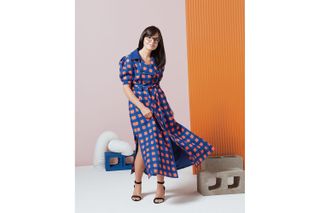
Physicist and activist Dr Jess Wade, 30, is a research associate at Imperial College London and an advocate for women in science and engineering. After rising to prominence for editing the Wikipedia profiles of unknown female scientists and bringing their achievements to the masses, Dr Wade has spent the past two years trying to improve representation of women, people of colour and LGBTQ+ scientists via Wikipedia
Marie Claire Newsletter
Celebrity news, beauty, fashion advice, and fascinating features, delivered straight to your inbox!
Lift others as you climb. I love celebrating the achievements of others, both online and offline. If you see someone doing something outstanding, nominate them for an award, or tell them they’re fantastic. Don’t be afraid of asking for help, either. Find a mentor who will advocate for your brilliance.
Make time for what’s important. Working in research means you’re always on your toes. There’s lots of lab time, meetings and data analysis and because of this, I do my Wiki profile work out of hours. There are so many outstanding people doing wonderful things in science but not getting the recognition they deserve – it is an immense privilege to document their stories.
Never stop reading. A life-changing event for me was reading Angela Saini’s book, Inferior: How Science Got Women Wrong – And The New Research That’s Rewriting The Story. It looks at how biased researchers have used bad science to make claims about women’s inferiority. Angela’s book taught me how wrong they were, but also about the women who, throughout history, have called them out. This inspired my Wikipedia editing, and I took it all over the world to give to scientists I met, before starting my campaign.
The theatre trailblazer

Lynette Linton, 29, is artistic director at London’s Bush Theatre. Earlier this year, she co-directed Richard II at the Globe Theatre with Adjoa Andoh. It was the first ever UK staging of a Shakespeare play to feature a company of women of colour
Being in a theatre for the first time was uncomfortable. I was 15 and didn’t feel I ‘belonged’. It was a long time before I began to see stories like mine on stage. Now we’re in a place where people running venues are listening. One of my aims is to braid our community further into theatre so they influence the work on stage, and vice versa.
Collaboration is key. Remember you’re not in this alone. Work hard to find mentors and other women to look up to, building a supportive network around yourself. I make sure the way I work is collaborative – at the Bush we make decisions including programming together. I value everyone’s opinion on that team because that’s how you make art.
The path isn’t always obvious, but stick with it. While working in the food hall of John Lewis, I joined the National Youth Theatre, which led me to meet the director Rikki Beadle-Blair. He gave me the confidence to write Step, which was later produced at the Theatre Royal Stratford East. The production led to directing jobs at the Gate Theatre and Donmar Warehouse, including a production of Lynn Nottage’s Sweat. Working with Lynn Nottage [the only woman to win the Pulitzer Prize twice] highlighted how important it is to pass the baton on to the next generation.
Be mindful of language. I’ve banned the word ‘risk’ in the theatre because all art is ‘risky’, particularly if you’re a woman of colour. It’s important to look past the boxes you are put into by society. ‘Risk’ is regarded as negative but some of the most incredible shows I’ve seen are the ones we might call ‘risky’.
The firefighting champion

Dr Sabrina Cohen-Hatton, 36, is one of the most senior female firefighters in the UK, and her research into firefighters’ safety has landed her ten international science awards. Her book, The Heat Of The Moment: Life And Death Decision-Making From A Firefighter, is out now
Being brave doesn’t mean not being afraid. It means doing something despite being afraid. When I was 15, I was homeless after my father died and family communications broke down. I sold the Big Issue and slept rough, then at 18, I joined the fire service. Now I’m a Big Issue ambassador, helping to give people on the fringes of society a voice. Because I’d spent so long trying to hide the fact I’d been homeless, the thought of speaking about it publicly made me nervous, but your circumstances don’t define you. I’ve been overwhelmed by the response from other women in similar situations, saying they now have hope.
The worst experiences shape you in incredible ways. A few years into my career, I responded to an incident in which my husband – also a firefighter – was nearly killed. It was the most difficult experience because I was torn between the role of a loved one and the role of a responder. He was fine, but our colleague was badly burned. In order to cope, I studied ways of reducing human error to make firefighters safer, studying all the way to PhD while working. Our research – exploring how brains work under pressure – changed national policy and was adopted by all UK emergency services.
My goal is to challenge stereotypes. This industry is just five per cent women, and I want the role of a firefighter to appeal to more of us. This isn’t because I believe in arbitrary quotas, but because being a firefighter is hard and we need the very best. Being different freed me from the constraints of a stereotype, allowing me to not only push the boundaries but also to create my own and make a real impact.
The media powerhouse
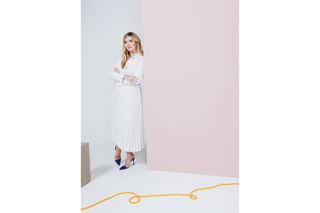
Emma Barnett, 34, is a BBC broadcaster, journalist and author. Presenting the morning programme on BBC Radio 5 Live and Late Night Woman’s Hour on BBC Radio 4. This year, she joined the Newsnight team as part of an all-female line-up, and her first book, Period., is out this month. Her agenda-setting interviews, grilling the likes of former prime minister Theresa May and Labour leader Jeremy Corbyn, have won her legions of fans and accolades.
Take the lead part in your life. Plenty of people treat themselves like an ‘extra’, instead of playing the lead. Plotting your path and the next step is crucial because no one else is going to do it for you. It’s something I’ve consciously done throughout my career. I haven’t necessarily known exactly what’s next but, especially in an industry like mine, you often have to be entrepreneurial about your next move. When I worked at The Telegraph, there had never been a women’s editor, so I pitched the idea to the deputy editor. If you can’t see a way out of your role, you have to create the one you want. Go for it, and worry about the details later. Just ensure you’re always taking an active part in what’s next for you.
Share the wealth. There’s more than enough to go round. I love helping people figure out their careers and introducing them to others who may be of use, both personally and professionally. A lot of careers advice tends to be quite selfish, but don’t forget you’re part of a community. I think a healthy approach is to always be thinking of ways you can broaden somebody else’s horizons. Giving something back not only feels good but it also often comes back to you later down the line.
Keep asking questions. And listen to the answers. When going for a job interview, for instance, the more questions you ask, the better you can assess whether a role is right for you. Sometimes, in the rush to move up or on, we make bad decisions, so it pays to be as prepared as possible by really doing your research.
The financial game changer

Former management consultant Alice Tapper, 27, is the founder and author of Go Fund Yourself, an online platform and community designed to make personal finance more relevant and relatable. Working as a consultant for financial institutions and start-ups, Tapper’s accessible money guides, digital masterclasses and weekly news bulletins focus on making complex topics digestible and entertaining. Her book, Go Fund Yourself, was released in July.
My career was born out of frustration. First, was the obvious problem that no one receives a financial education. We’re taught about Pythagoras and tectonic plates, but not how to budget, what interest rates are or why investing is a good idea. Instead, financial literacy tends to be inherited from parents. Over half of 22- to 29-year-olds have no savings. Personal finance is in need of an urgent facelift, which is how Go Fund Yourself came about.
I’m driven by a desire to combat shame around money. When I was researching my book, I spoke to many people about it, and their relationship with it. But my eyes were really opened when several close friends told me about their own crippling debt – I had no idea. I do what I do to empower and equip others, particularly young people, with the tools and inspiration to feel good about their money, and make better financial choices.
Great things are not achieved from your comfort zone. Generally speaking, the younger you are the less you have to lose, so put yourself out there. Taking calculated risks – like when I left my safe, corporate job to run Go Fund Yourself – can really pay off, but you have to be brave enough to try.
Perspective is key. Like many people, I’m prone to catastrophising, and I do it often. But I can’t name an occasion where things turned out even half as bad I thought they might have. Competition is a great example. I thought about the idea for Go Fund Yourself for over a year before I did anything about it. Other people were doing cool stuff and I felt like there was no room. But, the reality is, nobody can or should have an entire field to themselves; competition is good.
The humanitarian hero

Dr Sonia Adesara, 29, is a junior doctor and campaigner who believes everybody should have access to healthcare. As part of the Doctors For Choice UK team, she campaigns for the decriminalisation of abortion. The #AskHerToStand director is also passionate about encouraging women from diverse backgrounds to enter politics, as well as ending NHS charging for migrants and reducing racism in hospitals.
Tragedy shaped my career. My aunt died in hospital when she was 23 and, to this day, we don’t know why. After investigating, my mother was told her sister’s notes had ‘got lost’. This made me want to provide the best possible care to every patient. Sometimes, being a troublemaker is a good thing. Don’t be afraid to speak out. I use Twitter as a way of getting views out and raising awareness. I also do the tweets for Doctors For Choice UK, trying to counter misinformation and share facts around abortion. I remember learning at school that, prior to the NHS, people used to die of preventable illnesses because they couldn’t afford healthcare. I think I knew then that it was something I wanted to be part of.
Find your inspiration. My grandma shaped my career and life. Born in a village in India, her parents died when she was eight, and she was married off to a much older and abusive man. As a teenager, she left him and arrived in Uganda illiterate and with a baby, determined to make a better life. When I find myself questioning myself or what people think of me, I think of her. She didn’t make those sacrifices for me to take my privileges for granted.
Be curious. A couple of years ago, I volunteered for an outreach clinic in London and saw the impact a hostile environment, NHS charging and immigration policies have on people living on our streets. A young woman who’d been trafficked told me she was too scared to get help in case she was detained or deported. The experience made me adamant that our immigration policies were wrong and inhumane, and led me to campaign with other doctors to end them.
The groundbreaking scriptwriter
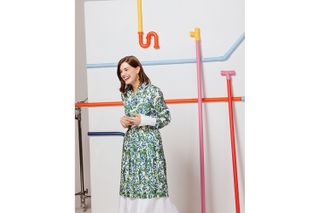
Laurie Nunn, 33, is the screenwriter and creator of Netflix’s smash hit Sex Education, starring Gillian Anderson and Asa Butterfield. The show won universal praise for its accurate portrayal of sex and friendships, and was estimated to have been watched by 40 million viewers. Prior to this, Nunn’s play, King Brown, won a judge’s award at the 2017 Bruntwood Prize for Playwriting. She has also had projects developed with major companies including Kudos, Channel 4 and Revolution Film.
I owe everything to my mentors. From university tutors to my agent and producers who commissioned early work from me. It was actually my secondary school media teacher, Miss Wolf, who encouraged me to apply for film school. I’d told her it ‘wasn’t worth it because not many women get in’. Her telling me, ‘You’ll never know if you don’t try’ really kick-started my career. The inspiration for Sex Education came from people and experiences in my own life – students I went to school with as a teenager, relationships with family and teachers, as well as formative friendships.
TV can change your life. When I was in my early twenties, I discovered a love of TV through box sets. By that time, I knew I wanted to focus on screenwriting and realised that telly was the medium where writers are most central. I was hugely inspired by female television writers like Shonda Rhimes, Phoebe Waller-Bridge, Issa Rae, Jill Soloway and Sharon Horgan. When creating Sex Education, I decided to focus on issues such as consent, body positivity and female pleasure/desire, in a funny and accessible way that hopefully encourages people to have a more open dialogue about things we usually find uncomfortable and awkward to talk about. The show provides a great opportunity to have a frank conversation about sex with a teen audience.
Clarity is kindness. Be brave and tell people you work with when you’re unhappy about something. When you find other creative people who you love working with, don’t take them for granted, no matter where they are in their career. Having an affinity with a collaborator is more important than working with someone more ‘successful’ who doesn’t really understand what kind of work you want to create.
The pioneering playwright

Cash Carraway, 38, is an award-winning playwright and author of Skint Estate, her memoir of being a working-class woman below the poverty line in modern Britain. Her play, Refuge Woman – about state violence and poverty porn – was nominated for Best Innovation at the British Journalism Awards in 2018.
Inspiration can strike anywhere. I was working in a Soho strip joint in London shortly before my mum threw me out. After finishing late one night, I walked down Shaftesbury Avenue and saw the words ‘Shopping’ and ‘Fucking’ lit up in neon on the Gielgud Theatre. A few days later, my friend and I bunked off school and went to a matinee, which changed my life. It was a play written in a vulgar language that I understood. It inspired me to know you could write in the same way you spoke, and be so honestly obscene in the retelling of your own story that it becomes a crude art form.
Never underestimate the power of believing in someone. When I was 17, I wrote a play called Knife Fight In A Phone Box, which I put on at school. One girl said it was embarrassing to reveal parts of my private life, and I was so embarrassed I never went back to school. Weeks later, my drama teacher wrote me a letter to say how much he enjoyed my play, and that no matter what I did with my life, I should carry on writing. His encouragement meant everything and it helped me realise it’s crucial to find a way to tell your stories, whatever your age or circumstances.
Ruffle feathers. When something doesn’t feel right, speak up. In the past, I’ve found myself going along with things that make me feel uncomfortable so that I don’t cause offence. I’m aware this comes from a place of privilege. I know from personal experience that it’s almost impossible to speak out if you’re working zero hours for minimum wage, because your bosses constantly make it clear just how disposable they think you are.
Reflect, reflect again, then take action. This is new to me because I’m an emotionally led person. It’s important to speak out when something isn’t right, but it’s only effective if you handle it in the right way. I have some rules I try to stick to: don’t send the angry email as soon as you’ve written it, go for a run or call a friend before you send it instead. Chances are, it needs toning down. And if you’ve been abrupt, always apologise and own your mistakes.
The sustainability innovator
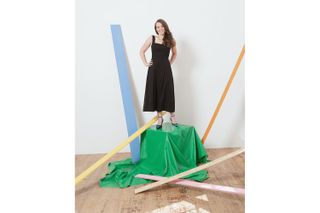
Tara Button, 37, is the founder of BuyMeOnce, the sustainability website designed to help the world ‘throw away its throwaway culture’. Set up in 2016, the site went viral after launching, with everyone from Ashton Kutcher to Caitlin Moran singing its praises, and now sells 2,000 different sustainable products. Button’s debut book, A Life Less Throwaway, was released last year.
A light-bulb moment can happen anytime. The idea for BuyMeOnce came from a Le Creuset pot – strange, but true. I was working in advertising and had been given it for my 30th birthday. I then realised most of the things I had bought up to that point were short-term rubbish. From then on, I wanted to buy the Le Creuset of everything. I looked for a website that sold the longest lasting products, but it didn’t exist. Over time, I found out about the environmental benefits of long-term buying and knew this was a solution to climate change. I built a website and, months later with only 100 products, it went viral and changed everything.
Chase connections. Humans live to connect, but we’re bombarded with messages from consumer culture about glorifying the individual, which makes us self-obsessed, anxious and lonely. The quickest cure for this is to imagine how others are feeling – it’s helped me immeasurably.
Guard your mind. When it comes to saying no to things we don’t need, we have to do that consciously. We receive millions of messages every day in advertising alone. My role now is to give people information, so that they can help make the best future possible, for themselves and the planet.
Draw a line. One of the most freeing things to know is that at any stage, you can draw a line in the sand and decide that life will be better or different from now on. Absolving yourself from past disappointments and moving forward with new vigour is transformative.
Sophie Goddard is the Entertainment Editor of Marie Claire UK, as well as working across other titles in a freelance capacity. She has over 10 years journalism experience working on both digital and print platforms and prior to Marie Claire, worked at Glamour and Cosmopolitan magazine. Sophie writes about a number of topics, specialising in celebrity interviews and features. At Marie Claire, she is responsible for booking and interviewing cover stars and other celebrity interviews and is always open to pitches from publicists (she is always open to discussing sausage dogs, too).
-
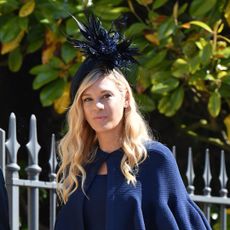 Prince Harry's ex girlfriend Chelsy Davy has ended her social media silence with an exciting announcement
Prince Harry's ex girlfriend Chelsy Davy has ended her social media silence with an exciting announcementBy Jenny Proudfoot
-
 Angelina Jolie’s words about “living as an older woman” are extremely powerful
Angelina Jolie’s words about “living as an older woman” are extremely powerfulBy Jenny Proudfoot
-
 The Perfect Couple cast formed a protest WhatApp Group to get the opening dance sequence shut down
The Perfect Couple cast formed a protest WhatApp Group to get the opening dance sequence shut downBy Jenny Proudfoot
-
 6 tips on navigating failure from our Futures Shapers judges
6 tips on navigating failure from our Futures Shapers judgesOur powerhouse Future Shapers 2022 judging panel talk career resilience and bouncing back from failure...
By Lauren Hughes
-
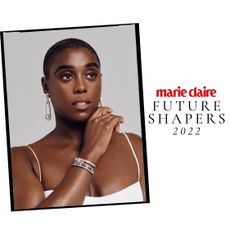 Women have been the true agents of change in 2022
Women have been the true agents of change in 2022This week marks MC Future Shapers 2022, recognising trailblazing women across all industries, and this year we are shining a spotlight on true agents of change.
By Jenny Proudfoot
-
 Meet the 11 incredible women we've named as our 2022 MC Future Shapers
Meet the 11 incredible women we've named as our 2022 MC Future ShapersBy Lauren Hughes
-
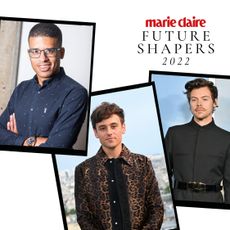 5 men who are challenging perceptions around masculinity in 2022 and beyond
5 men who are challenging perceptions around masculinity in 2022 and beyondThis MC Future Shapers 2022, we want to shine a light on the men making strides for positive change and redefining masculinity…
By Lauren Hughes
-
 How to grow your personal brand, fast
How to grow your personal brand, fastWith the biggest influencers in beauty on her books, Chloé Watts, CEO and founder of chloédigital, is sharing all her secrets on how to build a brand as an effective influencer. Time to listen up...
By Maria Coole
-
 9 valuable career tips to channel from women at the top of their game
9 valuable career tips to channel from women at the top of their gameYour new career commandments to live by.
By Catriona Harvey-Jenner
-
 Successful women on how to network like a pro
Successful women on how to network like a proThe experts explain how to find the people who will help lift you up...
By Catriona Harvey-Jenner
-
 This imposter syndrome test can tell if you're holding yourself back at work
This imposter syndrome test can tell if you're holding yourself back at work77% of the UK suffers from imposter syndrome. This test will help you to work out whether you do, too...
By Maria Coole